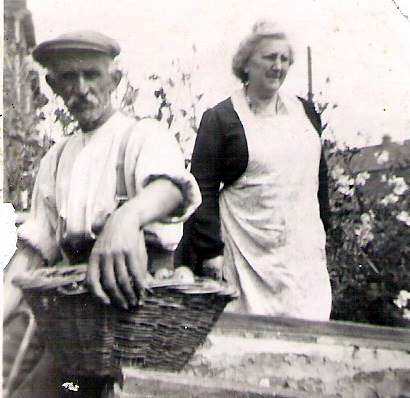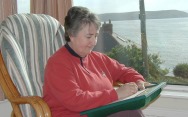CHAPTER 2
Growing Up
When I was a child there were no state funded schools once eleven had been reached. Although the headmaster thought that I would have no trouble passing the Entrance Exam to go to the higher school, when he came to see my Mother she had to refuse as there was no way she could afford it.
I was just twelve when Granny's house and home was sold and we moved in to live with my brothers and sisters. I was suddenly grown-up and life changed from an idyllic childhood to the harsh reality of being an adult.
My Step-Father's uncle had recently died and left him Millgate House Farm, Hemingborough, so we moved there and rented Mill House to the Wilson family. Mrs Wilson was a charlady for two days of the week and worked on the land for the other three. My Mother was too busy to do anything other than cooking and churning butter although she was a very good dressmaker. At sale time Mother and Father would go into Leeds and buy yards and yards of Serge for Gym-Slips and yards of white Cotton to make blouses for the girls. For the boys Mother would buy Velveteen to make Bib and Braces Trousers. I used to get the job of making the button-holes.
At school the girls had two dressmaking lessons each week and I remember making a Winciette Nightdress with an embroidered yoke. One of the lessons concentrated on learning how to darn and repair clothes. As I had so many brothers and sisters the teacher asked me to take in a bag of clothes needing to be mended which the other girls would help with.
Very few cars came into the village then. Most people got about by horse and trap or by bicycle.
I do remember the doctor who came from time to time. He had a beautiful Rolls Royce. I was so lucky to be the person who would direct him to different places. He called me the 'Little Lady' and I was indeed a lady when I rode beside him in the Rolls. When I had shown him the way he would give me a 2/- piece. I didn't see him when he last visited the village. When I arrived home from school one day I had a new little brother. Mother said that the doctor had asked for his 'Little Lady' and left me a 2/- piece. The next day we heard that he had died and I remember the sadness which I felt at hearing the news - he was a lovely gentleman.
I had to learn to make bread as we needed six loaves each day and dozens of tea-cakes. My Mother used to sit on the sofa and give me the instructions. The bowl was almost bigger than I was having a covering like fire-brick and polished on the inside. Kneading the dough was very hard work as I was never very big. The oven was heated with coal and oven-sticks usually from the hawthorn hedges. This combination could generate a lot of heat. The main baking day was on a Friday when the cakes and pastries were made. Everything had to run smoothly and a strict routine had to be followed.
The kitchen floor was made of brick and covered by a large hearth-rug. This floor had to be scrubbed twice each day.
By the time I reached thirteen my mother was still having children and we could only afford to have the char-lady one day each week. It was decided that I should stay off school two half days each week to help.
 My father was a very strict disciplinarian and each morning insisted that we all ate our porridge before having bacon and eggs. Each evening my father would make the porridge in a large iron pan. He would sit in a chair stirring away. The following morning it would be reheated adding milk which we always had plenty of as we kept some cows. One of my brothers hated the porridge. One morning the two of us refused to eat it and it was brought out each meal afterwards until we did. I can now understand that my father had to be firm with us to keep order in the house.
My father was a very strict disciplinarian and each morning insisted that we all ate our porridge before having bacon and eggs. Each evening my father would make the porridge in a large iron pan. He would sit in a chair stirring away. The following morning it would be reheated adding milk which we always had plenty of as we kept some cows. One of my brothers hated the porridge. One morning the two of us refused to eat it and it was brought out each meal afterwards until we did. I can now understand that my father had to be firm with us to keep order in the house.
Leading up to the Sunday School Anniversary was always a hectic time as Mother had to make new dresses, cotton petticoats and knickers all of which had to be embroidered. Considering there were six girls this was no mean task. On top of this she would make blouses and trousers for the boys. We all had to learn a poem to recite in the afternoon and evening. I recited one once which had fourteen verses. Outside the house in the yard were some stone mounting steps used by the men to get onto their horses and this was just the place to be quiet and learn the recitation in peace.
At Sunday School the older children had to help by teaching the younger ones which we really enjoyed. The workers at the Chapel would reward us with a party called a 'Tea-Feast' afterwards taking us to run races and play games in the grass field. The Collection taken at the Anniversary was used to pay for a trip to the seaside. We always went by train to Bridlington which seemed a very long way. It seemed as if all the village went on the trip. First the farmers would put carpets on their rulleys and the horses would pull us to the nearest station which was about two miles away. It always seemed cold riding home late at night and it was often 10 pm when we arrived home. It was always worth it though and we didn't really mind the late night cold. We always had a good time being given 6d to spend. We packed lunch and tea which were eaten on the sands.
Being a large family we all had our chores to do. My eldest sister and myself had to wash up after breakfast but first of all we had to help the younger ones dress for school. We all wore high-legged boots which needed lacing to the top. We also had long hair which had to be brushed. My hair was black with long curly ringlets but some of my sisters had long plaited hair tied with ribbon bows. To make sure that all this preparation could be done in time we all had to get up at 6 a.m. All the bed-clothes had to be laid over the bed-end before we went down to breakfast. Only after all these jobs had been done could we get off to school.
At night after dinner we would clear the dinner pots, wash up and then make our beds.
We lived in a big farmhouse with four bedrooms. My eldest brother, James, slept in a box-room on the front stairs. After James came five sisters. I slept with Granny Hanley until she died and then two of my sisters moved into her double bed. All the younger boys slept in a big bedroom. I had to bathe them at night and before getting into bed everyone had to kneel by their beds and say prayers. I loved my brothers such a lot although they were often naughty.
Father grew a lot of seedlings in celery frames pricking them out into beds in the garden until they were large enough to plant out in the fields. Mother would help with the pricking out and we were all in turn taught how to do it. One day my brothers smashed the glass frames with hammers and of course father was beside himself with rage. The boys used to have lots of friends who came round and one day they had found matches and proceeded to light a fire which burned down the barn full of straw. About two years later they set the stackyard alight. The water in the old pump dried up and the firemen had to get water from the river across the fields.
As we grew up and started work my eldest brother helped father on the land and I had to work for Mother. There wasn't enough work for my sisters so three of them found day work from other farmers such as picking potatoes, harvesting and pulling peas. They all seemed to enjoy potato picking so I persuaded Mother to let me join them but I had to do all my household jobs first before I went - wash the pots, prepare the vegetables and clean the floor. Mother cooked the meals.
At last my horizons seemed to be expanding and I could see a life beyond household chores.



